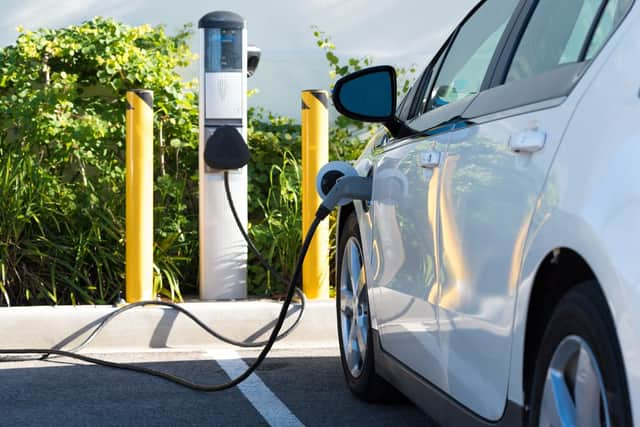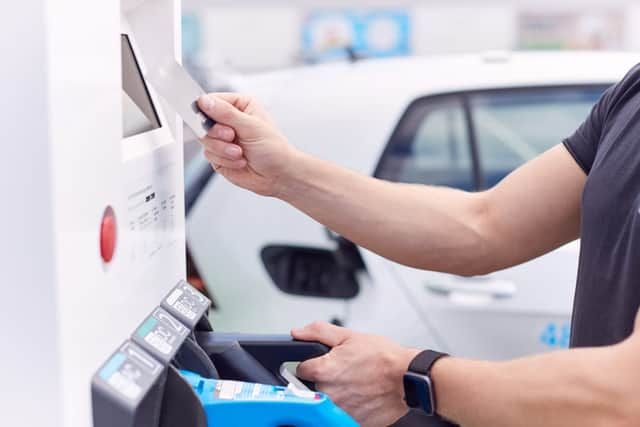Electric cars £100 a year cheaper to own than petrol over their lifetime


Switching to an electric car could save drivers more than £100 a year over course of its lifetime, according to new research.
Opting for a brand new EV rather than a petrol or diesel car carries a higher purchase price but this is balanced out by lower running costs later according to the analysis by Direct Line car insurance.
Advertisement
Hide AdAdvertisement
Hide AdThe insurer compared data on the purchase and running costs of five EVs and their combustion-engined equivalents and found that over the course of a 14-year lifespan, EVs are on average £1,492 cheaper - £52,133, compared with £53,625.
Even after for the Government’s £3,000 Plug-in Car Grant, EVs are around £5,000 (22 per cent) more than comparable petrol models but the Direct Line analysis estimates that savings in fuelling, tax, and maintenance, plus lower depreciation make them £107 a year cheaper to run. On average an electric vehicle will cost the owner £3,752 a year over the course of its life, compared to £3,858 for a petrol car.
Breakdown of costs associated with electric and petrol vehicles, 2020
| Expenditure type | Electric car | Petrol car | Difference | Comparison |
| Up-front purchase cost | £27,921 | £22,976 | +£4,945 | 22% more expensive |
| Fuel | £343 | £824 | -£481 | 58% cheaper |
| Tax and maintenance | £227 | £443 | -£216 | 49% cheaper |
| Insurance | £1,172 | £938 | +£234 | 25% more expensive |
| Total annual running cost | £1,742 | £2,205 | -£463 | 21% cheaper |
| Total lifetime cost | £52,133 | £53,625 | -£1,492 | 3% cheaper |
| Annualised cost | £3,751 | £3,858 | -£107 | 3% cheaper |
| Annual CO2 emissions | 0kg | 1,867kg | -1,867kg | 100% lower |
Source: Direct Line Car Insurance 2020
The research compared five different EVs and their ICE equivalents over a 13.9-year period, estimating an average annual mileage of 7,900 miles. It found that annual tax (currently zero) and maintenance costs (including MOTs and servicing) for electric vehicles are 49 per cent lower than for petrol models, while refuelling costs 58 per cent less. However, insurance costs are on average 25 per cent higher for electric vehicles.
Advertisement
Hide AdAdvertisement
Hide AdNeil Ingram, head of motor product at Direct Line, commented: “It is an exciting time for electric vehicles, with a record number of these licensed cars on Britain’s roads last year. Our analysis also shows that with the ban on new non-electric cars set to come into force in less than 15 years’ time, Britons could already be saving money by switching from a traditional petrol or diesel car to an equivalent electric model.
“We expect prices to come down in future, thanks partly to the Government’s commitment to making greener vehicles more accessible but also to advances in technology ensuring that purchasing, refuelling, maintaining and insuring an electric car becomes easier, cheaper and better for the environment.”
Fiona Howarth, CEO of Octopus Electric Vehicles said the research added to the environmental arguments in favour of switching to an EV. She said: “We are facing a climate emergency and must act now to accelerate the end of the internal combustion engine. However, the switch to EVs doesn't just make environmental sense, it's better financially too. Going electric allows you to take advantage of government incentives, zero congestion charge, and save 90 per cent on fuel costs – not to mention the fact that flexible leasing plans can eliminate upfront costs. Now has never been a better time to go electric.”


Anca Young, insight and intelligence manager at Thatcham Research, said that as more people opt for electric vehicles production costs will come down, helping to encourage further uptake.
Advertisement
Hide AdAdvertisement
Hide AdShe commented: "As demand for EVs increases, there is a corresponding reduction in production costs per unit, which encourages further take up. Although the cost of Lithium-ion batteries used in EVs is reducing, they remain more expensive than conventional internal combustion engine (ICE) powertrains and are therefore generally more expensive to purchase.
“There’s movement towards greater collaboration between vehicle manufacturers with a view to reducing the cost of EV development and production. Manufacturer EV platform collaborations are becoming more popular, where one manufacturer makes the platform and others share it with unique bodies. Notable collaborations include Volkswagen and Ford, General Motors and Honda and Toyota with Subaru.”